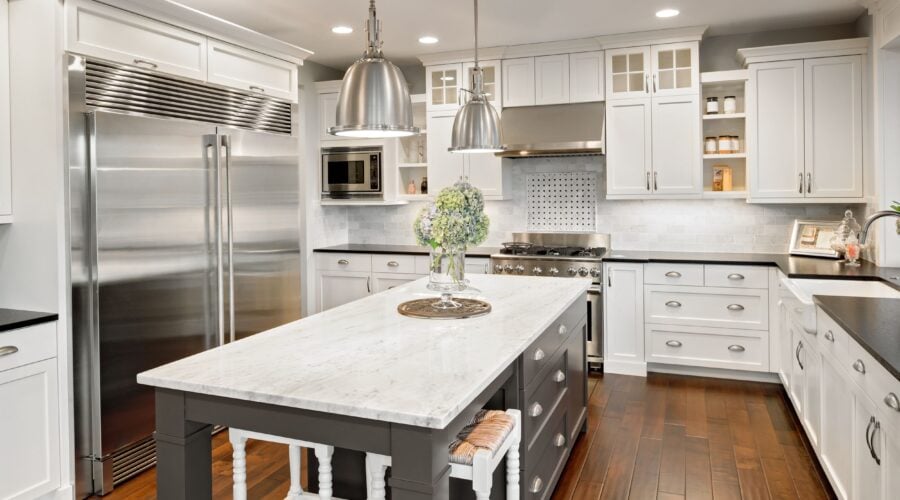How do I choose the best kitchen remodeler for my budget in Dunedin
- What are the most common mistakes to avoid when choosing a Dunedin kitchen remodeler
- How can I ensure my Dunedin kitchen remodeler stays within my budget
- What questions should I ask a potential kitchen remodeler during a consultation
- How do I verify the credibility and experience of a kitchen remodeler in Florida
- How important is it to see before-and-after photos of previous Florida kitchen renovation projects
To choose the best kitchen remodeler for your budget in Dunedin, follow these steps:
1. Set a Realistic Budget
- Determine your budget range, including a contingency fund of 15-20% for unexpected costs.
- Understand typical costs in Florida:
- Basic Remodel: $10,000–$15,000
- Mid-Range Remodel: $15,000–$30,000
- High-End Remodel: $30,000–$50,000+ (can exceed $75,000 for luxury projects).
2. Research and Shortlist Contractors
- Look for licensed and experienced contractors with expertise in Dunedin kitchens. Factors like climate-resistant materials and local building codes are crucial.
- Contact at least three contractors for quotes and review their portfolios.
3. Evaluate Contractor Bids
- Ensure bids include detailed scope of work, materials, timeline, and costs. Avoid choosing solely based on the lowest price; prioritize quality and transparency.
4. Check Reviews and References
- Read reviews online and ask contractors for references from past clients.
- Verify their credentials and confirm they have experience with projects similar to yours.
5. Plan Design and Materials
- Choose durable materials suitable for Dunedin’s humid climate, such as quartz countertops or ceramic tiles.
- Select appliances early to ensure proper layout planning.
6. Communicate Clearly
- Discuss your vision, timeline, and expectations with the contractor.
- Ask questions about their process, warranties, and how they handle unexpected issues.
7. Consider Local Expertise
- Choose contractors familiar with your area to ensure competitive pricing and material availability.
By following these steps and carefully vetting contractors, you can find a remodeler who fits your budget while delivering high-quality results.
What are the most common mistakes to avoid when choosing a Dunedin kitchen remodeler
When choosing a kitchen remodeler in Dunedin, avoid these common mistakes to ensure a smooth and successful project:
1. Not Vetting Contractors Thoroughly
- Failing to check for licenses, insurance, and certifications can lead to hiring unqualified individuals. Always verify credentials and ensure compliance with Florida regulations.
- Neglecting references and reviews may result in hiring contractors with poor reputations or subpar workmanship.
2. Choosing Based Solely on Price
- Opting for the lowest bid often compromises quality. Instead, focus on value and ensure the scope of work and materials are comparable across quotes.
- Cutting costs in critical areas, such as waterproofing or durable materials, can lead to long-term issues like mold or premature wear.
3. Inadequate Planning
- Starting without a clear budget or detailed plan can lead to overspending or delays. Collaborate with your contractor on a comprehensive design and timeline.
- Overlooking the workflow or layout, such as appliance placement and counter space, can make the kitchen less functional.
4. Ignoring Measurements
- Incorrect measurements for cabinets, appliances, or islands can cause costly rework. Always double-check dimensions to ensure proper fit and spacing.
5. Neglecting Contracts
- Proceeding without a detailed written contract can result in misunderstandings about timelines, costs, or responsibilities. Ensure all terms are clearly outlined before work begins.
6. Overlooking Local Expertise
- Hiring out-of-state contractors unfamiliar with Dunedin’s unique climate and building codes may result in unsuitable material choices or non-compliance with regulations.
By avoiding these pitfalls, you can select a reliable contractor and achieve a high-quality kitchen remodel that meets your needs and budget.
How can I ensure my Dunedin kitchen remodeler stays within my budget
To ensure your kitchen remodeler stays within your budget, follow these strategies:
1. Set a Clear Budget and Communicate It
- Establish a realistic budget, including a contingency fund of 10-20% for unexpected costs.
- Share your budget with the remodeler upfront and ask for a detailed proposal that aligns with it.
2. Plan Thoroughly Before Starting
- Create a comprehensive plan that includes all aspects of the remodel, such as materials, labor, permits, and unexpected expenses like debris removal or temporary dining arrangements.
- Avoid making impulsive decisions or last-minute changes, as these can significantly increase costs.
3. Prioritize Key Elements
- Focus your spending on high-impact areas like cabinets, countertops, and appliances while economizing on less critical features.
- Consider cost-effective options like cabinet refacing instead of full replacements or using laminate countertops instead of granite.
4. Stick to the Existing Layout
- Keeping the current kitchen layout minimizes expenses related to plumbing and electrical changes.
5. Track Expenses Closely
- Use a renovation budget template or app to monitor costs in real time. Compare estimated costs with actual spending to stay on track.
6. Limit Change Orders
- Changes during the project (change orders) can disrupt the budget and timeline. Finalize decisions on materials and design before work begins.
7. Choose Materials Wisely
- Research budget-friendly materials that are durable and stylish. Look for sales, discounts, or second-hand options to save money without compromising quality.
8. Work with Professionals
- Hire experienced contractors who provide transparent pricing and detailed contracts. Their expertise can help anticipate hidden costs and avoid costly mistakes.
By planning carefully, prioritizing wisely, and maintaining open communication with your remodeler, you can effectively keep your kitchen renovation within budget.
What questions should I ask a potential kitchen remodeler during a consultation
When consulting with a potential kitchen remodeler, ask these essential questions to ensure you’re making an informed decision:
- How long have you been in the home remodeling business?
- Are you licensed and insured?
- What experience do you have with projects similar to mine?
- Can I see your portfolio of completed kitchen projects?
- Do you handle all phases of the project, including design and construction?
- Will you obtain all necessary permits for the remodel?
- Do you use subcontractors, and if so, how do you vet them?
- What will the daily work schedule be like during the remodel?
- How do you handle unexpected issues or changes during the project?
- What is your estimated timeline for completing the remodel?
- Can you provide a detailed cost estimate for the project?
- Do you offer any warranties on your work and products?
- How do you handle post-completion issues or necessary touch-ups?
- Will I have access to my kitchen during the remodel, and if not, for how long?
- Do you manufacture and install your own products?
- What sets you apart from other kitchen remodeling contractors?
- Do you offer financing options?
- Can you provide recent client references?
- How do you communicate project updates and handle client concerns?
- What is your process for project completion and final walk-through?
By asking these questions, you’ll gain valuable insights into the contractor’s experience, work process, and reliability, helping you make the best choice for your kitchen remodel.
How do I verify the credibility and experience of a kitchen remodeler in Florida
To verify the credibility and experience of a kitchen remodeler in Florida, follow these steps:
- Check licensing and insurance: Ask for the contractor’s license number and Certificate of Insurance (COI). Verify these with Florida’s licensing board and the insurance provider.
- Verify certifications: Look for certifications from reputable organizations like the National Association of the Remodeling Industry (NARI). Check the certification body’s website to confirm the contractor’s status.
- Review their portfolio: Request a portfolio of completed kitchen projects, including before-and-after photos. This will help you evaluate their attention to detail, quality of work, and experience with projects similar to yours.
- Ask for references: Contact previous clients to inquire about their experience, project success, adherence to schedules, and budget management[3][4].
- Read online reviews: Check platforms like Google, Home Reno Florida for customer feedback. Look for consistently positive reviews and how the contractor handles any negative feedback.
- Verify experience: Ask how long they’ve been in business and their experience with Florida-specific requirements like dealing with humidity, hurricane-proofing, and local building codes.
- Interview the contractor: During the consultation, ask about their experience, process, and how they handle unexpected issues. Their communication style and professionalism can be indicators of their credibility.
- Check for complaints: Contact Florida’s consumer protection agency or the Better Business Bureau to see if there are any unresolved complaints against the contractor.
By thoroughly vetting a kitchen remodeler using these methods, you can gain confidence in their credibility and experience before hiring them for your Florida kitchen renovation project.
How important is it to see before-and-after photos of previous Florida kitchen renovation projects
Seeing before-and-after photos of previous projects is very important for several reasons:
- Demonstrates Quality of Work: Before-and-after photos instantly showcase the quality of a contractor’s work. They provide a quick and easy way to assess the level of craftsmanship.
- Highlights the Transformation: These photos emphasize the journey of a project, showing how a space was before and how it dramatically improved after the work. They highlight the amount of work that went into completing the project.
- Visual Communication: Photos offer a common vocabulary for clients and contractors, helping clients envision the potential of their space and communicate their preferences.
- Builds Trust and Reduces Skepticism: An outstanding photo portfolio can defend the quality of service without the contractor needing to say anything.
- Marketing and Online Presence: High-quality before-and-after photos are a great way to enhance online presence. They provide visual interest and can expand online reach.
- Showcasing Expertise: For designers, web developers, and anyone creating visual content, before-and-after photos can be used to show the ability to create what the client is asking for.
However, one source suggests to avoid posting before and after photos in portfolios because visual components are subjective, and potential clients may prefer the original version. Instead, it’s recommended to discuss the challenges presented by the initial phase of the project and showcase the results.
To maximize the impact of before-and-after photos:
- Take photos before work begins: Capture the property in its raw, beginning stage.
- Use matching compositions: Aim for similar angles and perspectives in both before and after photos.
- Highlight key features: Use the rule of thirds and other photography techniques to draw attention to important elements.


